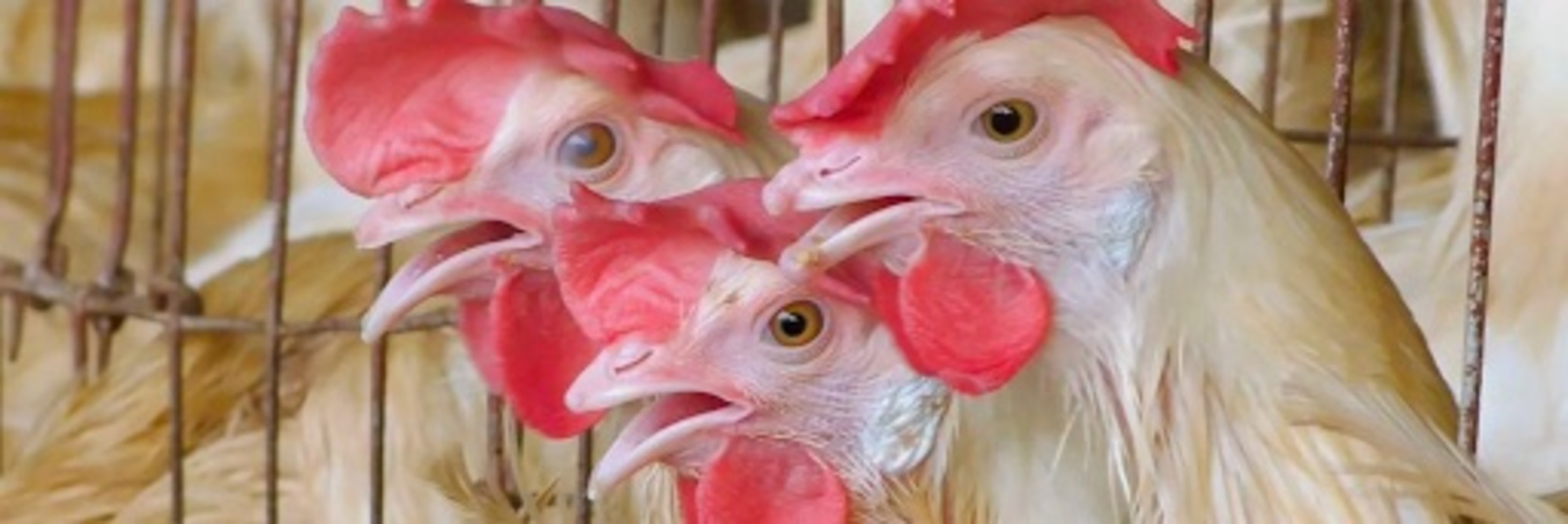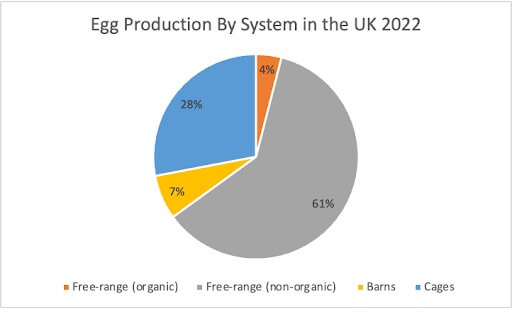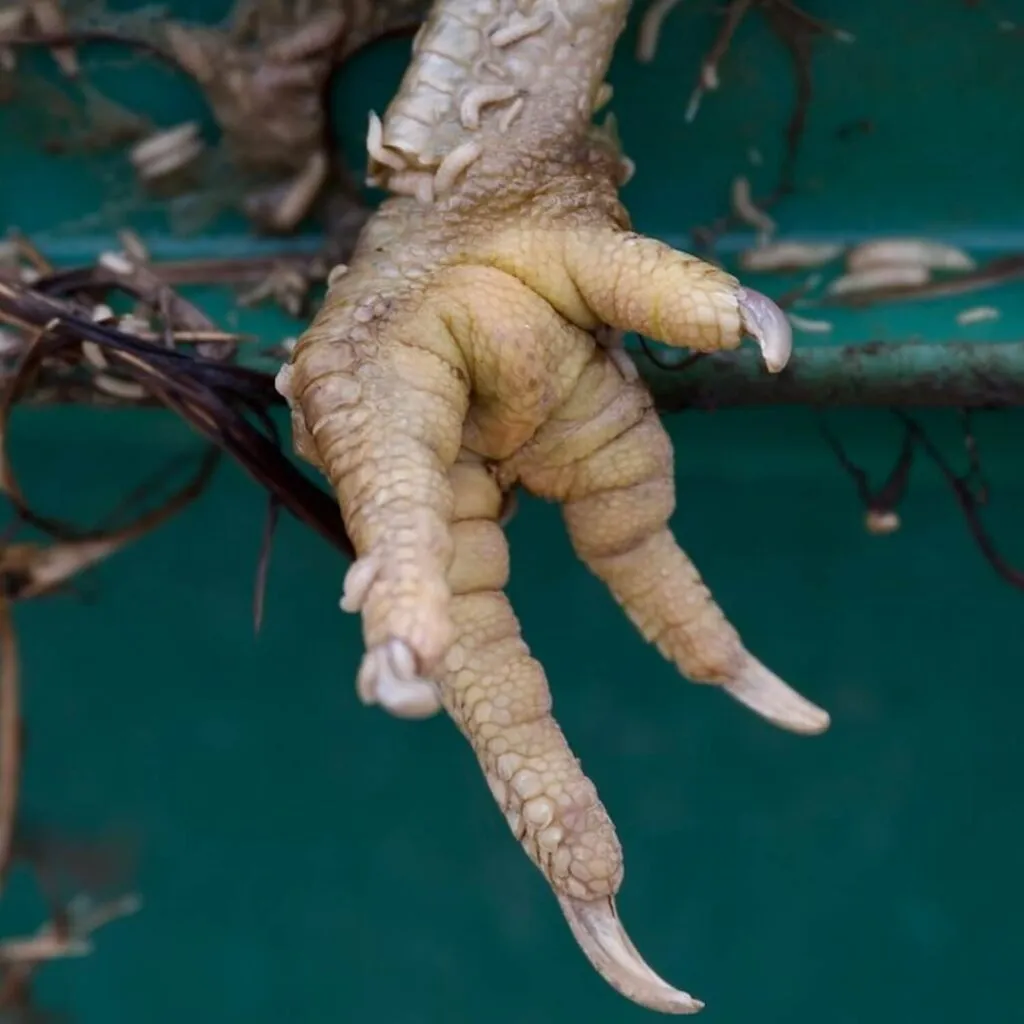Cracking Open the Truth Inside India’s Egg Farms

Between July and September 2023, Animal Equality’s investigators filmed 19 egg farms across India. In the states of Maharashtra, Andhra Pradesh, and Telangana, they found:
- Four to eight hens confined in cages no larger than two sheets of paper, trampling each other as they attempt to search for space.
- Hens with sore, cracked, and deformed claws from standing on wire cage floors.
- Faeces collected in piles underneath rows of stacked cages, where it remained for weeks at a time.
- Hens with feather loss and injuries from rubbing against the wire cages and ammonia build-up from the waste piles beneath them.
- Hens left to die slow, agonising deaths without medical care.
Illegal Animal Cruelty Under Fire in India
Animal Equality has conducted three investigations on egg farms in India. The initial exposé, released in 2017, found rampant, illegal cruelty. Despite reporting these findings to the Indian Government and proposing a transition away from cages, the Government’s response was an order to use slightly larger cages. Unfortunately, even these larger cages significantly limit hens’ movement, negatively impacting their quality of life and causing stress and illness among these sensitive creatures.
Recent polls highlight that the majority of Indian citizens believe the Government should enact stronger laws to better protect farmed animals. Despite this sentiment, while the demand for cage-free eggs is on the rise, a staggering 80% of eggs on the Indian market still originate from caged hens.
Barren so-called ’battery cages’ have been banned across the EU since 2012, and many cage-free systems are now in place. However, the landscape for hens exploited for their eggs in the UK and across the EU remains bleak. Cage-free will never mean cruelty-free. Even those hens who are not confined in cramped cages are unable to carry out many of their most natural behaviours, but equally banning cages is a critical step in dismantling this cruel system.
What Are Egg Farms Like In The UK?
Free-Range Vs. Barn Vs. ‘Enriched’ Cages

Despite the EU and UK bans on barren battery cages, data reveals that 28% of eggs passing through packing stations (specialised facilities where eggs are sorted, graded, and packaged before distribution to retailers or consumers) in the UK, still originate from hens confined to so-called ‘enriched’ cages. These cages, almost as cruel as their battery counterparts, offer each individual only around as much space as an A4 sheet of paper to live in.
While the majority of boxed eggs in supermarkets now hail from cage-free systems, these too come with their own cruelty. In barn systems, without cages, hens are afforded very little space – the equivalent to about one and a half A4 sheets of paper.
Free-range systems come with their own challenges too. You might think that free-range hens roam around outside throughout the day but, in fact, hens can be kept indoors for most of the day – up to 16 hours in winter, and even 24 hours during avian influenza outbreaks. They too spend most of their lives crammed into filthy, crowded sheds with a similar amount of space to live in as hens on barns.
Even for those who do try to make it outside, not all will have the opportunity to, since some hens often guard the shed’s exits to show dominance and restore some kind of pecking order. Originally, chickens are jungle birds who are frightened of their predators and naturally seek shelter to keep themselves from harm’s way. Without the right outdoor environment, many can become scared of the vast empty space before them. Hens do not belong in any farmed system.
Animal Equality’s Investigations
In our investigations spanning egg farms across the UK and the EU, irrespective of whether eggs come from caged or cage-free systems, we have consistently uncovered instances of animal cruelty and/or illegality.
One notable case was our 2018 investigation at Walston Poultry Farm in Dorset, a supplier of ‘Big & Fresh’ eggs that had at the time links to major supermarkets including Tesco, Morrisons, Asda and One Stop. In this facility, 80,000 hens were confined in giant sheds and were locked in stacked ‘colony cages’ seven tiers high. The grim findings included birds suffering from severe feather loss, red and raw skin, dead birds left among the living, cannibalism, wounds from pecking, and a failure to meet welfare regulations by inspecting all birds daily.
Footage captured by Animal Equality at Kinswood Eggs farm, accredited by the ‘Laid in Britain’ quality assurance label, revealed similar miseries. Our 2020 visits revealed distressed hens in similar deplorable conditions.
Turning to free-range systems, our investigation in Baden-Württemberg, Germany, targeted four farms, two of which boasted the highest organic food standards globally. Alarming discoveries included animals crammed together in stressful conditions, sick and injured chickens left untreated, carcasses decomposing for days or weeks, feather pecking, and signs of cannibalism.
Next Steps
Across the world, Animal Equality is working tirelessly to raise awareness of the plight of hens trapped in the egg industry.
In India, while urging consumers to try plant-based alternatives, Animal Equality’s team is encouraging egg companies to stop the use of cruel cages. And change it seems, is already afoot:
Many food companies have started sourcing eggs from cage-free farms, and some egg producers have also started expanding their cage-free facilities. This proves that this initiative is here to stay. Now, we only hope the government will also support this initiative by phasing out cages.
Amruta Ubale, Executive Director of Animal Equality in India
The team is also continuing to collaborate with the Indian Government to eliminate some of the worst abuses of hens nationwide. A recent milestone includes submitting a study illustrating how farmers can transition away from caged systems in practice.
In India, our dedicated team is also advocating for an end to cruel male-chick killing. Tragically, male chicks are often killed within hours or days of being born, as they cannot lay eggs and so are considered worthless to the industry. Our team is calling for an introduction of in-ovo gender determination technology that would help stop this vile practice.
We are also pushing for a ban on forced moulting of hens. This is routinely carried out by the egg industry, where companies will deliberately remove food and/or water from birds for a prolonged time in order to increase egg production and, in turn, profits.
In Europe, Animal Equality is also continuing to fight for hens. Following Animal Equality’s campaigning and lobbying work, a proposal to introduce a ban on the killing of male chicks in the egg industry has finally been approved by the Italian Parliament. This historic victory for animals will end the cruel practice of male chick culling by 2026, stopping the slaughter of up to 40 million male chicks every year in Italy.
And just last year, Animal Equality in Europe launched its ‘No Animals in Cages’ campaign, with the team personally delivering a letter to the Ministry of Agriculture, Fisheries, and Food. This letter called for all species to be included in its updated legislation, for imports to meet Europe’s cage-free standards, and for ambitious deadlines to be implemented in the country.
Try Plant-Based
The bottom line is that eggs sold in stores, no matter their origin, involve cruelty. The pathway towards a compassionate choice is clear: opt for plant-based alternatives. As we step into 2024, the possibilities are abundant! You can bid farewell to eggs and still enjoy a healthy and delicious diet: from scrambled tofu for breakfast to aquafaba meringues for dessert – there truly is no excuse!
Recommended




